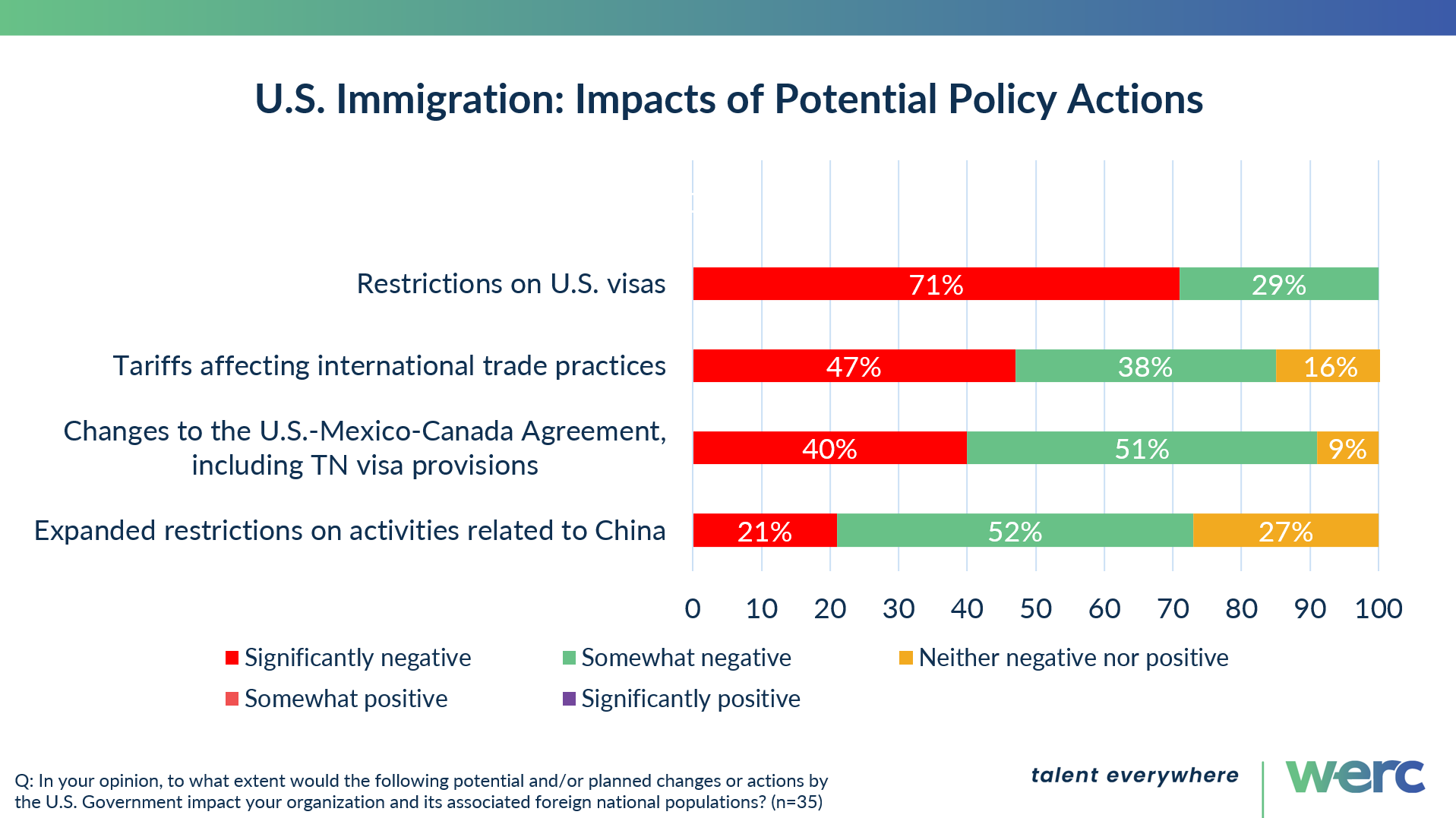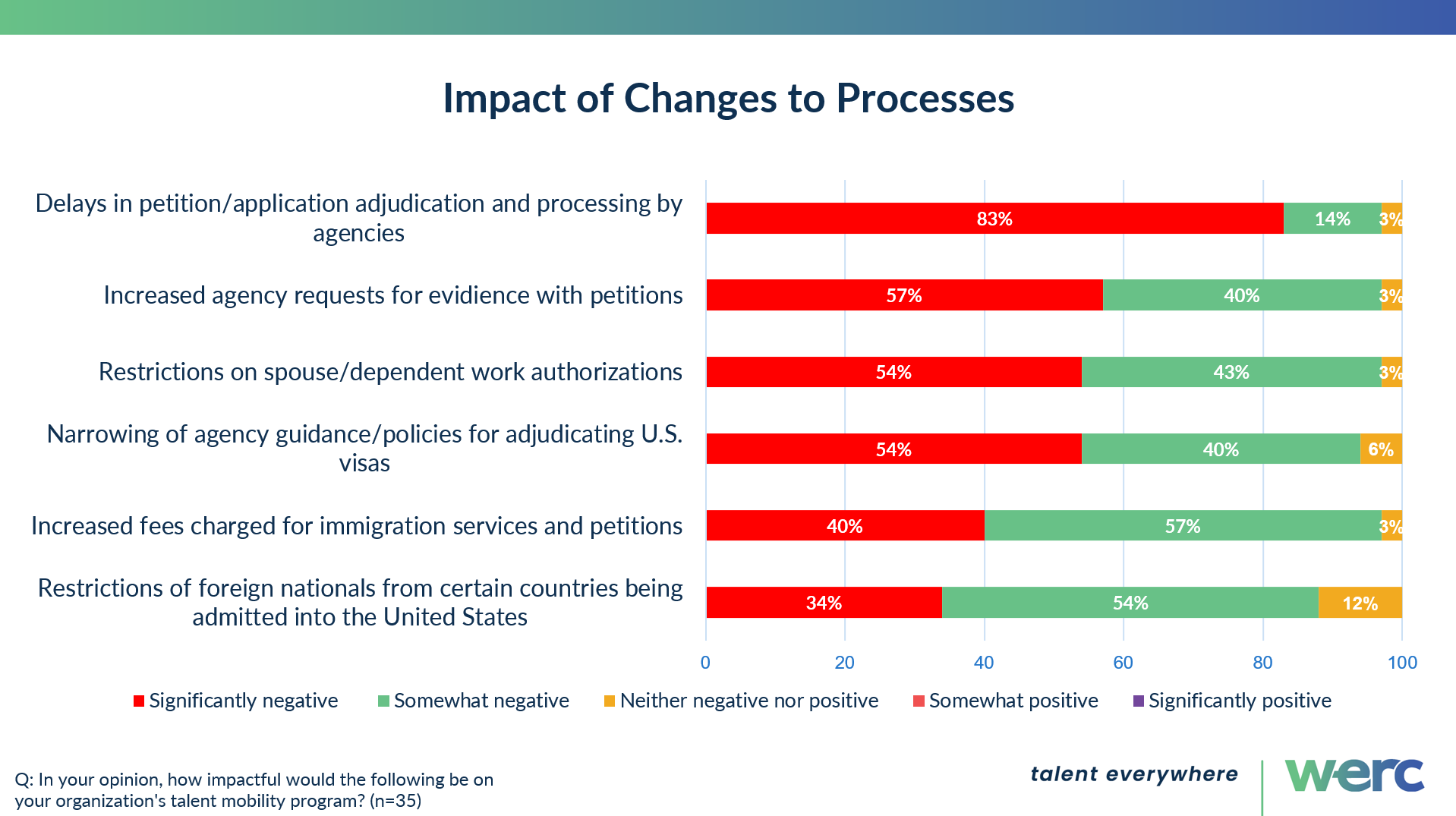As the Trump administration makes changes to U.S. employment-based immigration processes and requirements, WERC conducted a pulse survey of corporate mobility practitioners to determine how such actions might impact their organizations and ability to move talent.
Responses are from 36 member organizations, 97% of which are multinational organizations with employees in the United States and abroad. These organizations have substantial impacts on the global economy, with 79% reporting annual global revenues of over $1 billion. Respondents are also primarily large employers, with an average U.S. employee headcount of more than 21,000 and global employee headcounts of nearly 50,000.
Key Findings Point to Negative Impacts
Overwhelmingly, respondents note somewhat negative to significantly negative impacts of potential policy actions.
U.S. visa restrictions and trade-related actions, including those related to the U.S.-Mexico-Canada Agreement (USMCA), are potential policy actions most likely to have significantly negative impacts on companies and their foreign national populations. Most notably, 100% of respondents said that restrictions on U.S. vias would have a significantly or somewhat negative impact on their organizations.
Canada- and Mexico-related actions are particularly top-of-mind for global mobility practitioners and their organizations. Canada (43%) and Mexico (20%) are among the largest non-U.S. markets where employee populations are located.
- 91% say changes to the USMCA, including TN provisions, would have a negative impact on their organization and foreign national populations.
- 94% of respondents say restrictions to and/or the elimination of the nonimmigrant USMCA Professional (TN) visa for Canadian and Mexican nationals would have a negative impact on their talent mobility programs.
- 53% of respondents indicate that their organization would consider moving current and future employees to non-U.S. locations if changes are enacted. Canada is the most likely market (79%) and Mexico the fourth most likely (21%).

Changes that increase processing timelines, process uncertainties, and process costs are most likely to have negative impacts on corporate talent mobility programs.

Two of the three most frequently used visa-related pathways for early-career talent are the H-1B (72%) and the F-1 Visa Optional Practical Training (OPT) and Curricular Practical Training (CPT) programs (39%). Actions impacting visa options for early career talent (potential or existing) would result in an especially negative impact. These actions include:
- Restrictions to and/or elimination of the OPT/CPT programs (92%).
- Changes to the H-1B visa program registration and selection process for cap-subject petitions (80%).
- Restrictions to the J-1 Visa Exchange Visitor Program, also known as BridgeUSA (59%).
Limitations in access to or the usage of employment-based visa options, particularly nonimmigrant visas, would have direct and adverse impacts on U.S. employers, their workforces, and their ability to operate competitively.
- Seventy-two percent indicate that limitations on U.S. nonimmigrant visa options would impact their ability to successfully compete in a global business environment. Sixty percent indicate that such limitations would make reduced revenues likely; 32% say it would likely result in American (domestic) employee headcount reductions.
- Similarly, 69% say limitations on U.S. immigrant visa options would affect their ability to compete globally.
In Their Own Words
Open-ended comments from the survey highlight in greater depth how these changes could impact organizations’ hiring practices and immigration strategies. One respondent says, “Any additional limitations/exclusions applied to foreign students/workers will only shrink a labor force that is already small to begin with. This will most likely only result in wage escalations and ultimately higher costs, which will be passed along to our clients.” That individual also expects longer processing times, delayed onboarding, and ultimately the loss of talent.
Another respondent also cites talent as potentially being impacted by the changes. “This could mainly impact our current U.S. workforce on nonimmigrant visas and some intermittent travelers coming into the U.S., mainly from Canada,” they say. “If we’re unable to maintain this talent, we can run into disruptions in the business and may need to look into alternate locations to move this talent to. If our existing employees are not able to become lawful permanent residents (LPRs) and/or run out of H-1B time, then we would lose them (unless they can relocate), and then we would have even more open requirements to fill.”
A Realistic Outlook
The Trump administration has already started implementing many of the immigration policy changes it pledged to before coming into office. This survey seeks to gauge how some of the largest organizations are responding to and preparing for such change. Results indicate concerns around the adverse impacts for employers and their foreign national employees. They also reflect the need for the talent mobility industry to come together to raise these issues to policymakers and share how changes may impact U.S. businesses, American workers, and the U.S. economy.
WERC continues to monitor these developments. Members can access the full report online. Those interested in continuing the conversation are encouraged to speak with Mike Jackson, vice president of public policy and research for WERC, or reach out to the Mobility News content team.
WERC Advocacy Day takes places Wednesday, 14 May. Join your peers in Washington, D.C., to advocate for urgent issues, including reinstating the moving expense tax deduction and addressing challenges affecting the U.S. employment-based immigration system.